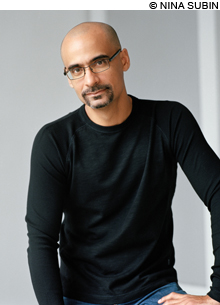
HAPPY ENDING “I’m one of those very fortunate people who stuck with something that they found difficult,” Diaz says.
|
Junot Diaz shows up late for our interview, his Red Sox cap askew and one shoelace untied.He'll be speaking in about an hour at the Rhode Island School of Design, whose incoming students read his Pulitzer Prize-winning novel The Brief Wondrous Life of Oscar Wao (2007) over the summer.
He asks if he can stand up for our chat — his hurry made physical. But it quickly becomes clear that Diaz — witty, engaged, and quite fond of the f-bomb — does not need a compressed schedule to focus his considerable energy.
A Dominican immigrant who grew up in blue-collar New Jersey and now teaches creative writing at the Massachusetts Institute for Technology, Diaz is an intellect of remarkable breadth — fluent in Spanglish, sci-fi, hip-hop, and academese.
All of that is on display in his new collection of short stories, This Is How You Lose Her, which marks the return of Yunior, a Diaz alter ego confronting his brother's diagnosis with cancer and his own serial infidelity.
The book was a long time coming. Diaz makes no secret of his struggle with the writing process. I ask him about that struggle, about cheating and — the day before the election — about President Obama.
The interview is edited and condensed.
WRITING, AS FAR AS I CAN TELL, MAKES YOU MISERABLE. WHY? My sense of it is I'm one of those very fortunate people who stuck with something that they found difficult.
That's not the way out society tends to think of work, nor does it tend to think of art. It tends to think if you're good at something, that means you have great facility at it. That's not actually the case, not in real life.
SO HOW DID YOU CONVINCE YOURSELF TO STICK WITH IT AFTER SOME EARLY STRUGGLES? Because you love the thing and it's not as if anyone's life was depending on it. I mean, what was the big deal if I failed? I mean, I wanted to be an artist. I didn't want to be a doctor, I didn't want to be a dentist.
What's at stake besides my ego? If it's just your ego, shit, I can fucking hover over this disaster for quite a long time.
YOUR NEW BOOK DEALS QUITE INTENTLY WITH INFIDELITY. SO WHAT HAVE YOU CONCLUDED ABOUT WHY WE CHEAT? I don't know about any conclusions. I think I mostly chart the consequences of infidelity, the consequences of persistent evasions vis-à-vis intimacy. I mean when I think of the stories, I think about half the book has nothing to do with infidelity. In fact, there's probably the same amount to do with cancer as infidelity. I've probably drawn better conclusions about cancer than I have about the fact that we live in a society that doesn't punish boys for infidelity as much as it punishes girls. You know, I think if I have any conclusion, it is if you've gotta cheat, be a boy.